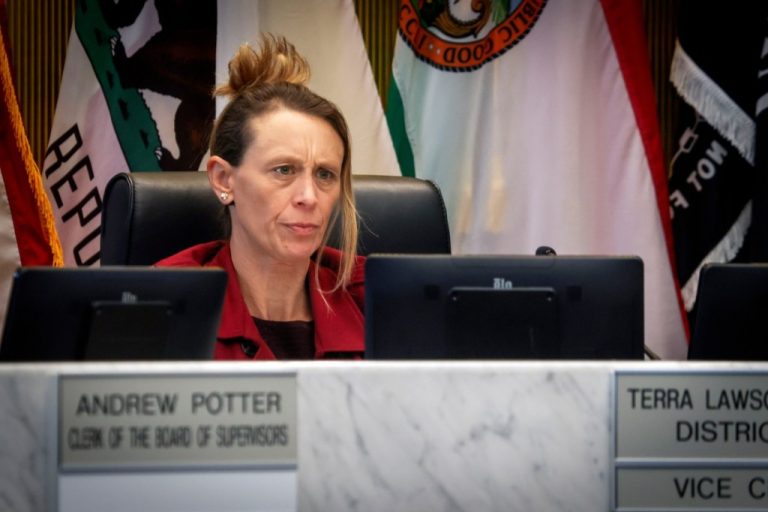A recently censured San Diego Superior Court judge who was accused earlier this month of making “racist and insensitive comments” both in his courtroom and in a private meeting with two chief public defenders has denied those allegations, writing in a court filing that some of his comments were taken out of context and others were simply not true.
The denials were part of a filing in which Judge Howard Shore declined to recuse himself from hearing a motion in a homicide case. A deputy public defender had sought to disqualify Shore from the case, citing both his alleged “dishonesty and criminality” related to the censure and his allegedly racist and insensitive remarks.
It’s now anticipated that a different judge — either one of Shore’s colleagues, or potentially a judge from another county — will hear the motion and decide whether to disqualify Shore.
Last month, California’s Commission on Judicial Performance issued Shore a “severe” public censure — the strongest sanction short of removal from the bench — after an investigation found he skipped 155 days of work. The commission found that Shore’s conduct violated multiple canons of the Code of Judicial Ethics and “seriously undermines public confidence in the integrity of the judiciary and casts disrepute on the judicial office.”
Earlier this month, Deputy Public Defender Abram Genser filed a motion to disqualify Shore from hearing a Racial Justice Act motion in a homicide case, citing the censure as one reason Shore should recuse himself. It also cited “his prejudicial conduct, statements, and rulings toward Black, Indigenous, and People of Color.”
Included in the motion was a remarkable declaration by two top leaders from the Office of the Public Defender who swore, under penalty of perjury, that Shore had made “racist and insensitive comments” during a private meeting with them.
Shore had requested the meeting to give advance notice of the censure before it was made public. He met with Katherine Braner, who at the time was interim head of the Office of the Public Defender, and Megan Marcotte, head of the office’s Alternate Public Defender component.
Braner and Marcotte declared that during the meeting, Shore downplayed the conduct that led to his censure, including the fact that he was not honest when first confronted about skipping work. They wrote that because of Shore’s actions, he had “lost judicial legitimacy and irreparably damaged confidence in his judicial integrity.”
The declaration also disclosed that all four chiefs from the Office of the Public Defender’s various branches had taken the exceptional step to meet with the county’s presiding judge and request that Shore no longer preside over any cases of defendants represented by public defenders.
“I do not believe that my recusal would serve the interests of justice,” Shore wrote Friday in a six-page response to the disqualification motion.
He wrote that he denied any bias or prejudice based on his meeting with Braner and Marcotte, and that he took “no offense” to Genser’s challenge and could remain impartial.
Among the allegations Braner and Marcotte made in their declaration was that Shore told them that tenants “have too many rights.”
Shore wrote in his answer that he did discuss eviction cases, but he flatly denied stating tenants have too many rights.
Braner and Marcotte also declared that the judge compared Palestinians living in Gaza and working on the farms of his Israeli relatives to “our Mexicans” who cross the border to work on U.S. farms.
“I deny referring to the people of Gaza as being similarly situated to ‘our Mexicans,’” Shore wrote. “I deny that my failure to raise or comment on the humanitarian costs of the war stems from any racial bias or prejudice.”
Paul Rodriguez, who took over as the county’s head public defender between the time of the meeting and when the declaration was filed, said he supported his chiefs. “I stand behind the sworn declaration by Ms. Braner and Ms. Marcotte,” Rodriguez wrote in an email Tuesday.
In his disqualification motion, Genser cited several of Shore’s previous statements in court as evidence of alleged racial bias. Shore admitted the transcripts of those statements appeared accurate.
“However, I deny that any of my statements or rulings were based on bias, prejudice, or animosity,” the judge wrote. “The statements I made during these various court hearings were merely my efforts to gain a greater understanding of the facts and the law.”
It’s now up to Genser and county prosecutors to agree on which local judge will hear the disqualification motion. If they can’t agree, the state Judicial Council will appoint a judge, possibly from out of county. If whichever judge hearing the case disqualifies Shore, a new local judge will be assigned. If not, Shore will hear the motion in the homicide case.







